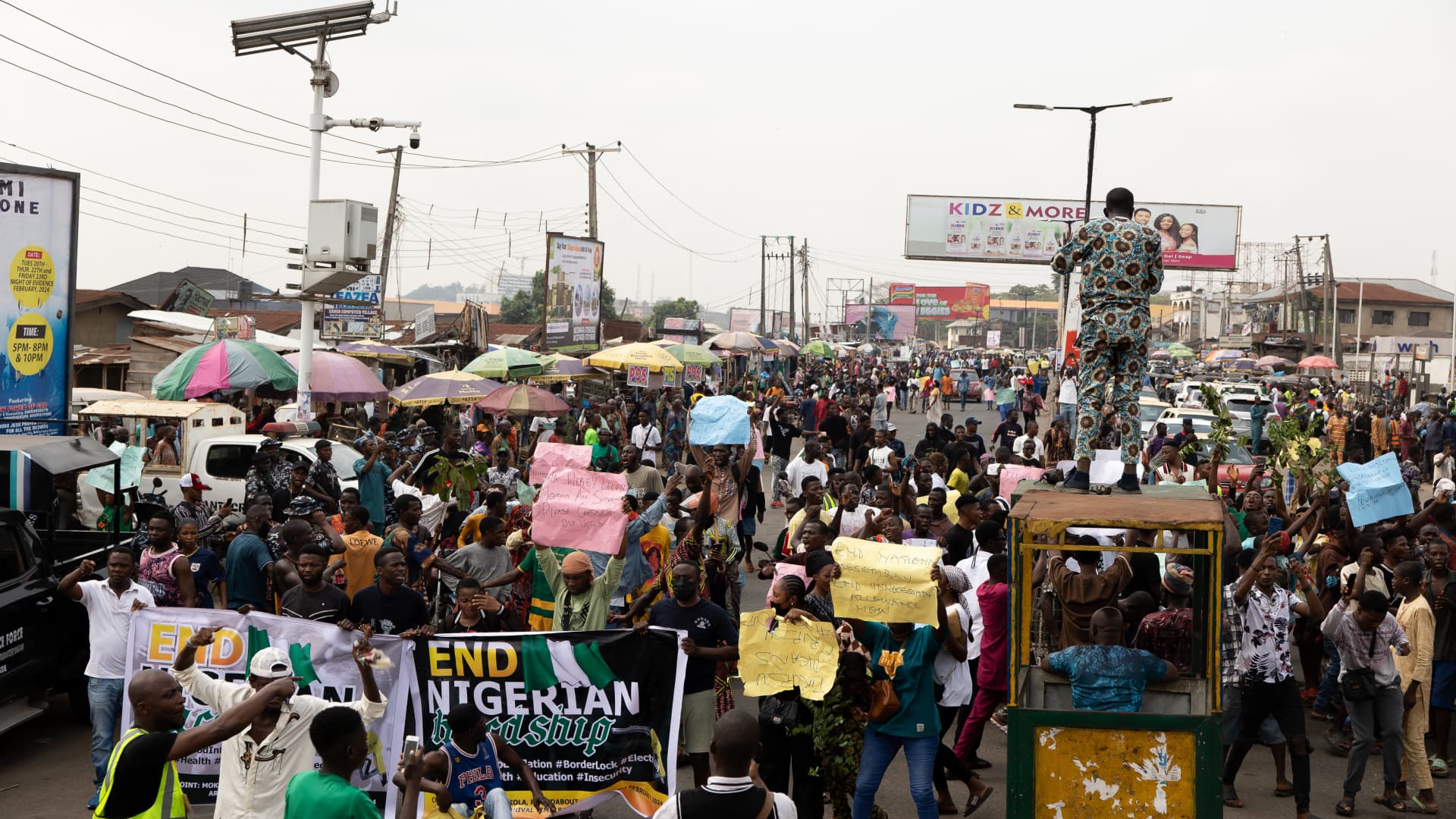IBADAN, Nigeria – Feb. 19, 2024: Demonstrators are seen at a protest against the hike in price and hard living conditions in Ibadan on February 19, 2024.
Samuel Alabi | Afp | Getty Images
With annual inflation nearing 30% and a currency in freefall, Nigeria is facing one of its worst economic crises in years, provoking nationwide outrage and protests.
The Nigerian naira hit a new all-time low against the U.S. dollar on both the official and parallel foreign exchange markets on Monday, sliding to almost 1,600 against the greenback on the official market from around 900 at the start of the year.
President Bola Tinubu announced Tuesday that the federal government plans to raise at least $10 billion to boost foreign exchange liquidity and stabilize the naira, according to multiple local media reports.
The currency is down around 70% since May 2023 when Tinubu took office, inheriting a struggling economy and promising a raft of reforms aimed at steadying the ship.
In a bid to fix the beleaguered economy and attract international investment, Tinubu unified Nigeria’s multiple exchange rates and enabled market forces to set the exchange rate, sending the currency plunging. In January, the market regulator also changed how it calculates the currency’s closing rate, resulting in another de facto devaluation.
Years of foreign exchange controls have also generated enormous pent-up demand for U.S. dollars at a time when overseas investment and crude oil exports have declined.
IBADAN, Nigeria – Feb. 19, 2024: Demonstrators hold placards during a protest against the hike in price and hard living conditions in Ibadan on February 19, 2024.
Samuel Alabi | Afp | Getty Images
“The weakened exchange rate should increase imported inflation, which will exacerbate price pressures in Nigeria,” Pieter Scribante, senior political economist at Oxford Economics, said in a note Friday.
The country is Africa’s largest economy and has a population of more than 210 million people, but relies heavily on imports to meet the needs of its rapidly growing population.
“Shrinking disposable incomes and worsening cost-of-living pressures should remain concerns throughout 2024, further stifling consumer spending and private sector growth,” Scribante added.
Inflation, meanwhile, continues to soar, with the headline consumer price index hitting 29.9% year-on-year in January, its highest level since 1996. The increase is being driven by a persistent rise in food prices which jumped by 35.4% last month compared to the year before.
The surging cost of living and economic hardship prompted protests across the country over the weekend. The plummeting currency has added to the negative impact of government reforms such as the removal of gas subsidies, which tripled gas prices.
President Tinubu said in late July that the government had already saved more than 1 trillion naira ($666.4 million) from removing the subsidies, which it will redirect into infrastructure investment.
LAGOS, Nigeria – Sept. 25, 2023: Street currency dealers at a market in Lagos, Nigeria.
Bloomberg | Bloomberg | Getty Images
Alongside soaring inflation and a plunging currency, Nigeria is also battling record levels of government debt, high unemployment, power shortages and declining oil production â its main export. These economic pressures are compounded by violence and insecurity in many rural areas.
“Excess market liquidity, exchange rate pressures, and food and fuel shortages threaten price stability, while inflation risks rising out of the government’s control,” Oxford Economics’ Scribante added.
“Robust import demand could force the Central Bank of Nigeria (CBN) to reimpose import bans and FX restrictions to lessen the burden on the balance of payments. This could exacerbate domestic product shortages and increase inflation further.”
Inflation is expected to peak at nearly 33% year-on-year in the second quarter of 2024, according to Oxford Economics, and could stay higher for longer given the plethora of economic risks ahead.
“Furthermore, rising inflation and increased hawkishness by the CBN indicate that the policy rate could be raised this quarter,” Scribante said. The policy rate currently sits at 18.75%.
“We expect a combined 200 bps in rate hikes at the next two MPC meetings, scheduled for end-February and end-March this year; however, we think that more hikes are needed to stem rising inflation,” Scribante added.
Jason Tuvey, deputy chief emerging markets economist at Capital Economics, sees the CBN opting for a bigger interest rate bazooka when policymakers meet on Feb. 26 and 27.
“The meeting will be a key test of whether the policy shift under President Tinubu is truly regaining some momentum,” Tuvey said in a note Thursday.
“We expect that the MPC will try to restore some of its inflation-fighting credibility by delivering a large interest rate of 400bp, to 22.75%.”







